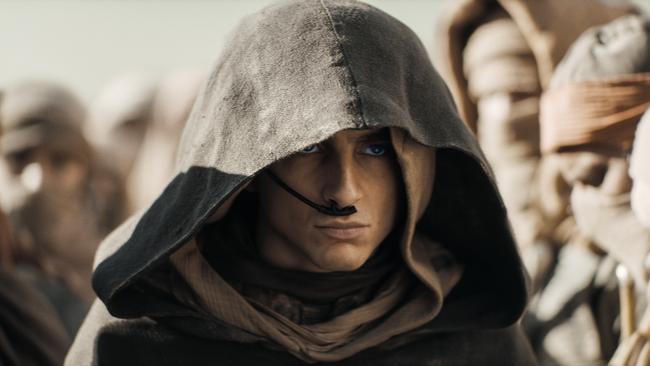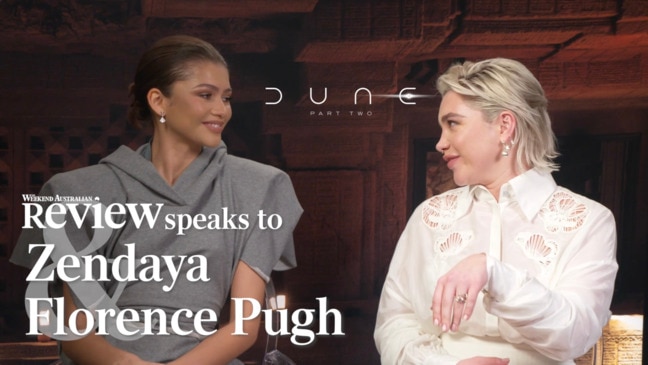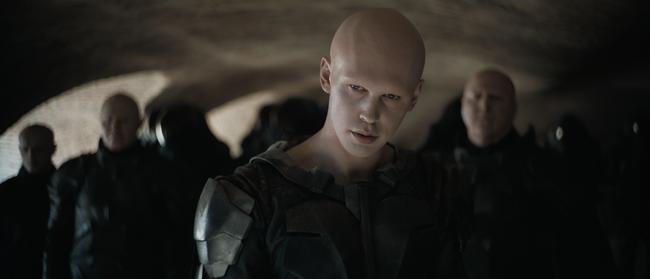Three stars: Dune Part Two just doesn’t live up to the hype: review
One of the year’s most anticipated films is nice to look at, but is let down by bland acting and a script that does no great service to its impressive cast.

Dune: Part Two (M)
167 minutes
in cinemas
★★★
Here are the strengths of Dune: Part Two, the second instalment of Denis Villeneuve’s adaptation of Frank Herbert’s 1965 science-fiction novel.
First, and above all, the film work by Australian cinematographer Greig Fraser, who won an Oscar for the first instalment, Dune (2021).
There are visually amazing scenes that demand to be seen on the big screen. The standout moment is Timothee Chalamet snaring and riding a giant sandworm. It’s like the 1978 surfing movie Big Wednesday transposed to the desert.
Second, the music by Hans Zimmer, who also won an Oscar for Dune. Third, some of the action scenes are spectacular. Fourth, Chalamet has to show a hard edge and he does it well.
He is Paul Atreides, an exiled duke from the planet Caladan who his enemies thought died at the end of Dune.
He did not, which goes to one of the hard-to-avoid weaknesses of the film. With a third instalment in the pipeline, if Paul’s in a life-or-death struggle it’s not hard to guess how it will turn out.

It’s the far distant future and he’s on the waterless, spice-rich planet Arrakis aka Dune. He wants to join the oppressed people to fight the aristocratic oppressors, who are led by Stellan Skarsgard doing a Jabba the Hut impersonation.
One of the freedom fighters (Zendaya) is his potential love interest. Their leader (Javier Bardem) believes Paul is the messiah. Others think he is a false prophet.
The main baddies are Dave Bautista, looking permanently nervous, an interesting persona for the ex-wrestler, and Austin Butler, acting psychotic. Like their Jabba-like leader they are bald.
Lurking in the wings is Christopher Walken as emperor of the known universe, Charlotte Rampling as the Imperial Truthsayer and Florence Pugh as his ambitious daughter. Rebecca Ferguson, as Paul’s pregnant mother, channels Lady Macbeth.

So, we have themes such as colonisation, fascism, religious fundamentalism, resource exploitation, guerilla warfare, familial tensions and weapons of mass destruction. There are riffs on Star Wars, Game of Thrones and Ridley Scott’s Gladiator (2000)
There’s a lot there and almost three hours to tell it, but the weaknesses of this film, which outweigh its strengths, are the terrible dialogue (Bardem’s main line is “It is written!”), the lack of pacing and the almost non-existent links from one scene to the next. The script is by the director and Jon Spaihts.
It’s as though Villeneuve shot a lot of film, chopped it into five-to-10 minute segments and threw them into some sort of “and then this happened” order. Chalamet starts off as a mistrusted outsider, wins a few fights, rides and sandworm and, bang, he’s the saviour.
He is a self-doubting one though, and that’s a point of interest. He can see the future and he does not like what he sees. When his former mentor (Josh Brolin, whose main line is “M’Lord”) asks if it’s “Because you lose control”, he replies “Because I gain it’’.
Dune-ophiles may well argue that it all makes perfect sense. If you are not in that camp and plan to see this film, I suggest you watch the first instalment, and perhaps even read the novel, in advance. Personally, I found this intergalactic epic easy to look at but unimaginative, underwhelming, poorly plotted, blandly acted and a bit dull.
-
Crime and replenishment
All Your Faces (MA15+)
French language with English subtitles 118 minutes
In cinemas as part of the Alliance Francaise French Film Festival, March 5-April 9 www.affrenchfilmfestval.org
There are several movies I want to see at the Alliance Francaise French Film Festival, which is in its 35th year. Top of the list is Mr Blake at Your Service!, in which John Malkovich is a widowed British businessman who takes a job as a butler at a French manor house.
The headline act is a two-part action adventure drawn from the celebrated 1844 novel by Alexandre Dumas, The Three Musketeers: D’Artagnan and The Three Musketeers: Milady. I’m also keen on The President’s Wife, starring Catherine Deneuve as Bernadette Chirac.
The one I’m reviewing here is All Your Faces (Je Verrai Toujours Vos Visages), written and directed by Jeanne Herry, whose directing, writing and acting credits include the hit French television series Call My Agent!
Her previous film, In Safe Hands (2018), explores adoption, in the pre and post-adoption sense. So does All Your Faces, but this time the before-and-after is crime. The focus is France’s restorative justice program, which has been running since 2014, two decades later than the initiative started in Australia. The idea is to put offenders and victims in the same room and encourage them to talk in a spirit of restoration rather than retribution.
“Restorative justice is a combat sport,” a trainer warns his mediators-to-be. No doubt it often descends to that, but in this case the conflict is emotional rather than physical. In a believably humorous moment the victims, ahead of the first meeting with the offenders, ask each other what they should wear.
The film follows two storylines. In one, three victims meet three offenders in the prison in which the latter are incarcerated. The offenders, all male, are not “their” offenders but are guilty of similar crimes. Nawelle (Leila Bekhti) was robbed at gunpoint as she worked as a cashier at a mini-market. Sabine (Miou-Miou, the director’s mother) was mugged in the street. Gregorie (Gilles Lellouche) was the victim of a home invasion. Each crime involved violence.
Nassim (Dali Benssalah) is a home invader. It is chilling when he calmly explains how he goes about “the job”. Issa (Birane Ba) is a small-time holdup man who thinks, because he’s black and poor, that he is the real victim.
In the second story, the victim, Chloe (Adele Exarchopoulos), does go through the process of meeting the offender: her half-brother Benjamin (Raphael Quenard), who repeatedly raped her when she was seven.
The ensemble cast is convincing in this journey towards and through the psychological trapdoors of the victim-offender duality. Sometimes the two are “from a different planet”, as Sabine puts it; sometimes they are almost the same person. There is fear and anger, judgment and compassion on both sides. In gripping, revelatory scenes, each victim, facing the offenders, talks about the personal aftermath of the crime.
Chloe turned to self-harm. Slicing a razor through her skin made her feel “disinfected; clean”. Gregorie says: “I’m not the same man; my life’s not the same.” Sabine and Nawelle each became shut-ins, too scared to leave home.
Each story comes to a conclusion that is worth waiting for. The meeting between Chloe and Benjamin is powerful and confronting. The relationship between the victims and the offenders who did not offend against them develops across the five-week mediation and contains its own surprises.
This immersive film investigates the motivations for and ramifications of crime. It’s Sabine who best sums up the complexities involved when she responds in an unexpected way to a challenge from Nassim, having had a week to think about it. “It feels weird saying this but it’s the truth.”



To join the conversation, please log in. Don't have an account? Register
Join the conversation, you are commenting as Logout